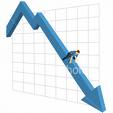Top Economic Stories of 2010: Quantitative Easing, Currency Wars, Economic Stagnation

1. European Union (EU) Debt Crisis
The bailout of Greece and Portugal in 2001 put strains on the whole Euro system. A single currency with competing national capitals and a diverse range of economies is unsustainable. Portugal is unlikely to survive beyond the first half of 2010 without a bailout. Spain is the big one that will break the Euro up.
The UK has no such EU protection being outside the Eurozone. It will depend on the International Monetary Fund (IMF) for such a bailout with much more draconian measures imposed on it. The UK is likely to face its own debt crisis at some point over the next five years. The UK’s current debt stands at 76% of the economy (GDP) or 180% of annual national income. By the end of the coalition’s term it will be 110% of GDP and 267% of national income. This is of course based on 2% growth in the economy per year for four years which is away above the estimates of all independent economic think tanks. Flat growth over the next four years – a more likely scenario given the effects of the cuts – would see a further £100 billion added to the debt total at the end of their term.
£305 billion of our existing debt has to be renewed or repaid over the next five years – 64% of our pre-credit crunch debt. Another£540bn -based on government estimates- has to be taken out over the same period to cover the annual deficits. We will pay £282.5 bn of interest over this period rising to £68.5bn per year or13% of national income. A large slice of our debt is linked to inflation – the higher inflation the more of the loan we must repay and the more annual interest we must pay – which has seen the deficit rise by £12 bn more than estimated over the last four months wiping out the “savings” from the June emergency budget cuts.
2. A Jobless Partial Stagnant Recovery
Despite a modest recovery in developed economies unemployment remains high. In the USA it stands at near 10% as it does in Europe. Underemployment is around 17%. In the UK unemployment is approaching 8% and likely to rise to three million by the end of 2011 and four million by the end of 2012. The economies of the global developed countries remain well below their 2007 peak, The UK’s, for example, current GDP is now barely above 95% of its 2007 peak.
3. Quantitative Easing (QE)
Is the act of government banks printing money and buying bonds (largely government bonds) from banks. This puts large amounts of cash into the hands of banks with the idea that they will then lend it to individuals and corporations to help boost spending. The first round of QE during the financial crisis was in effect a way to give indirect bailouts to the banking system – very little of the money flowed into the real economy. In the UK the Bank of England printed £200bn most of which was held by banks against potential loses.
The second round of QE is a lot more sinister. The US has announced that it will print $600bn most of which it hopes will flow into emerging Asian economies helping further inflate the property and stock market bubble there and forcing these countries to put up their interest rates to curb inflation and the bubble. This will strengthen these currencies making US goods more competitive on the world market. It is a currency war by another name.
4. Currency Wars
Emerging economies have recovered better than developed economies because of their higher rates of profit. The global imbalances of trade – exports over imports – have been exacerbated by this. Strengthening currencies have seen this position of superiority threatened. Only China has the ammunition to keep its currency artificially low but it too has had to raise interest rates to curb inflation and assets bubbles. US QE (see above) will put further pressure on these economies and there is a possibility of an asset bubble collapse and economic slowdown just when the developed economies are running out of steam.
5. China Rising
In 2010 China became the world’s second largest economy surpassing Japan. As China becomes more powerful a different type of economic system will rise. China is a country where the state is the principal economic actor and it uses markets for ultimately political purposes. We have never lived in a world before where the two most important economic players are fundamentally in competition.
6. Agricultural Inflation
Agriculture prices began to rise across the world at the end of 2010 particularly in wool, cotton and beef. Climate chaos and the increasing demand of the middle-class of the emerging countries particularly China are the root cause. This will see developed economies caught between inflation and recession with interest rates likely to go up to curb inflation when economies remain stagnant. For the poor of the developing world this means more starvation and hardship.
The Left Banker wishes all his readers and followers a happy New Year and will try to continue in 2011 to provide accurate predictions on the world economy (the Left Banker was ranked fourth for 2010 by Bloomberg amongst a universe of 1000 global analysts for the accuracy of his economic predictions) as well as a radical perspective that puts people before profit.

